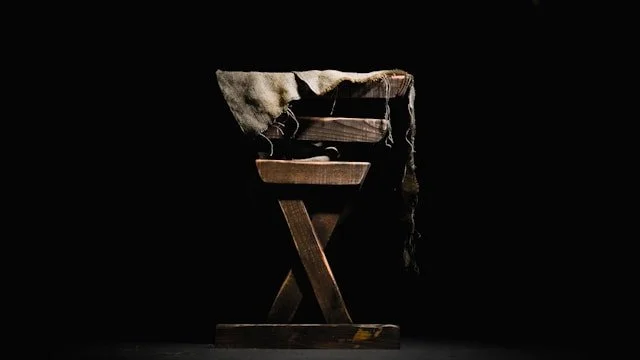Afraid of the dark: Chrys Jones says, “For those of us who have seen the Light, Advent is a time of sober remembrance. We are reminded of the darkness that once resided in us. We lived in the valley of the shadow of death without even realizing it. But the goodness and lovingkindness of God showed up!”
Did the Son of God leave heaven when he came to earth: Kevin DeYoung answers, “The key is to understand that the Son of God descended from heaven in such a way as to still be in heaven. Christ’s incarnational descent did not involve a change to the divine nature or a change of location.”
Glory to God in the Lowest!
Last week on The World and Everything in It George Grant considered “The Wisdom of paradox.” He concludes his reflection, that Christmas is “the greatest and most remarkable paradox of all is revealed: He who was infinite, was yet an infant; He who was eternal, was yet born of a woman; He who was almighty, was yet nursing at His mother’s breast; He who was upholding the universe, was yet carried in His mother’s arms. Thus, Chesterton exclaimed, ‘Outrushing the depth of the fall of man is the height of the fall of God. Glory to God in the Lowest.’”
“Glory to God in the lowest.” What a mind-bending truth.
The Faithfulness of God of the Manger
Recently we had someone over and as the night came to a close Angel warmly offered, “Let’s do this again soon!” I wilted as I processed just how many things were on our calendar in the coming month. Just like Angel did, I wanted to be with them again and soon, but her invitation made me flinch.
My wife Angel and I are very different people. Angel brings light and life everywhere. People are drawn to her, and she is drawn to people. One of the many things I love about Angel is how she gets caught up in a moment with people. In that space, it’s not unusual that she shares hopes with those we are with of spending more time together. And she means it: there is no doubt of her genuineness.
This Week's Recommendations
The uncarnation of Christ: J.A. Medders explains, “Our flesh and the devil are happy to uncarnate Christ—to reduce him to doctrinal points we affirm and then ignore him. But spiritual theology rejoices over Christ—his person and work—as our divine and personal Savior, Lord, and Friend.”
Looking at photos with my mum: Des Smith with a moving piece on aging and hope, “But Scripture also tells me there’s something else going on inside Mum. I can’t see it, but it’s there. ‘Outwardly we are wasting away, yet inwardly we are being renewed day by day’ (4:16). Somewhere in there, God tells me, there’s an invincible core; an iron spine of light that can’t be put out—that is growing in brightness.”
A Humble God?
“I don’t compare myself with anybody, but nobody is better.” Michael Jordan
“They say the sky’s the limit, but I think my potential is beyond it.” Jay-Z
“I won’t be happy until I’m as famous as God” Madonna
“I won’t be a rock star. I will be a legend.” Freddie Mercury
“We’re more popular than Jesus now.” John Lennon
We tend to expect that greatest among us are also some of the most arrogant. And why wouldn’t they be? For many who make it to the top of their field, we can see how that arrogance can be a driving force for their greatness.
The Just and the Justifier
God became flesh.
Let that sink in. Christianity asserts that God—sovereign, immutable, omnipotent, other—the eternal God who has no beginning and end—became a human being.
Because many of us have had exposure to Christianity from our early years, it is easy to miss how massive the theological implications of the incarnation are. The incarnation lays the groundwork for a God who chooses to participate in his creation. The incarnation denies the existence of an abstract and distant God, unmuddied by his handiwork.
This Week's Recommendations
Five things we’re missing the global church gets: Sean McConnell says, “Our theology may say one thing, but our behavior is often more focused on our work and our plans than God’s presence.”
What is the Devil’s part in temptation? Paul Tautges warns, “Just as he hounded Jesus all the way to the cross, so he never tires of tempting you. He’s always on the hunt, always waiting for an opportune time.”
The Theology of the Manger
“God did not, as the Bible says, create man in his own image; on the contrary, man created God in his own image.” Ludwig Feuerbach dropped this theological bombshell three years before Friedrich Nietzsche’s birth. Feuerbach, a name forgotten by most, but who influenced Nietzsche, wrote these words in his book, The Essence of Christianity (1841). He argued that human beings project their own attributes and desires onto an imagined deity, creating God in their own image. This for Feuerbach, is the essence of Christianity (and indeed all religions), the deification of our human ideals. “What man wishes to be, he makes his God… God is the outward projection of a man’s inward nature.”
Go To a Funeral
We Westerners avoid death.
When was the last time you walked through a cemetery? When was the last funeral you went to? Our churches no longer have cemeteries, those who are older head to retirement communities and then to head to long-term care or assisted care facilities. The number of funerals held in churches has diminished. Death has become professionalized, antisepticised, and remote.
This Week's Recommendations
God brings us bad to bring us best: Joni Eareckson Tada, “When God lobs a hand grenade into life and rattles our faith to the core, we wonder how he’ll work the pieces of shrapnel together for our good. What does good mean, anyway?”
Why we should expect witnesses to disagree: J. Warner Wallace, former cold-case detective explains, “I spent the first nine years of my career investigating crimes as a committed atheist. Even then, I would have approved the notion that witnesses who fail to agree on every detail, raise as many questions as they seem to answer and are inaccurate in some detail of the event, could still be trusted as reliable eyewitnesses.














